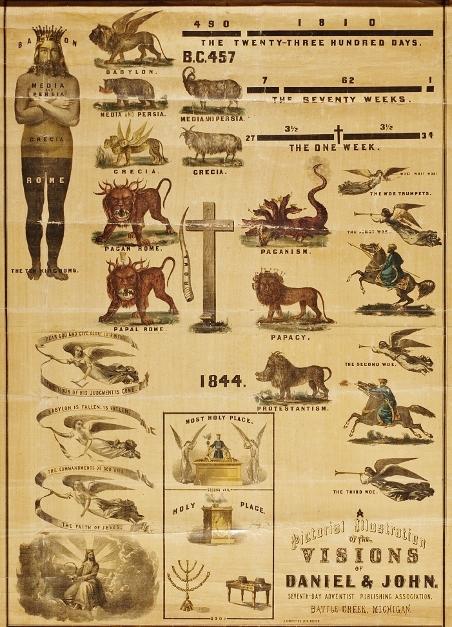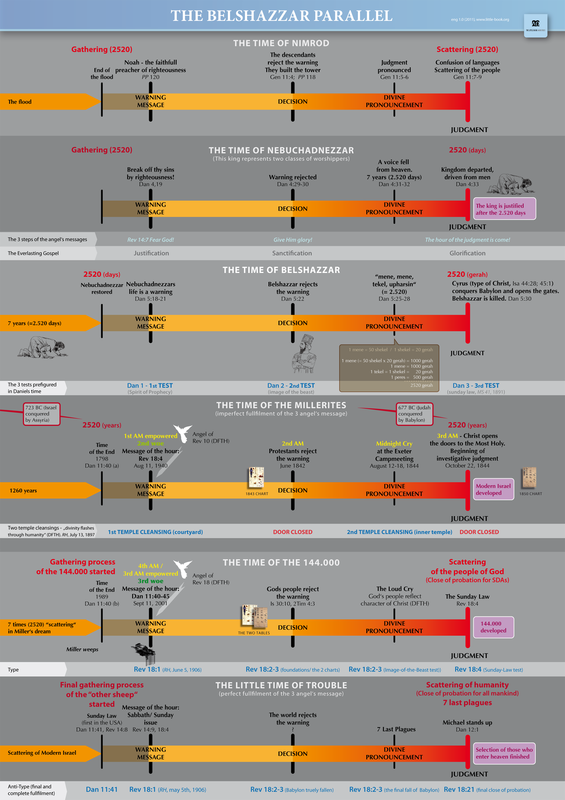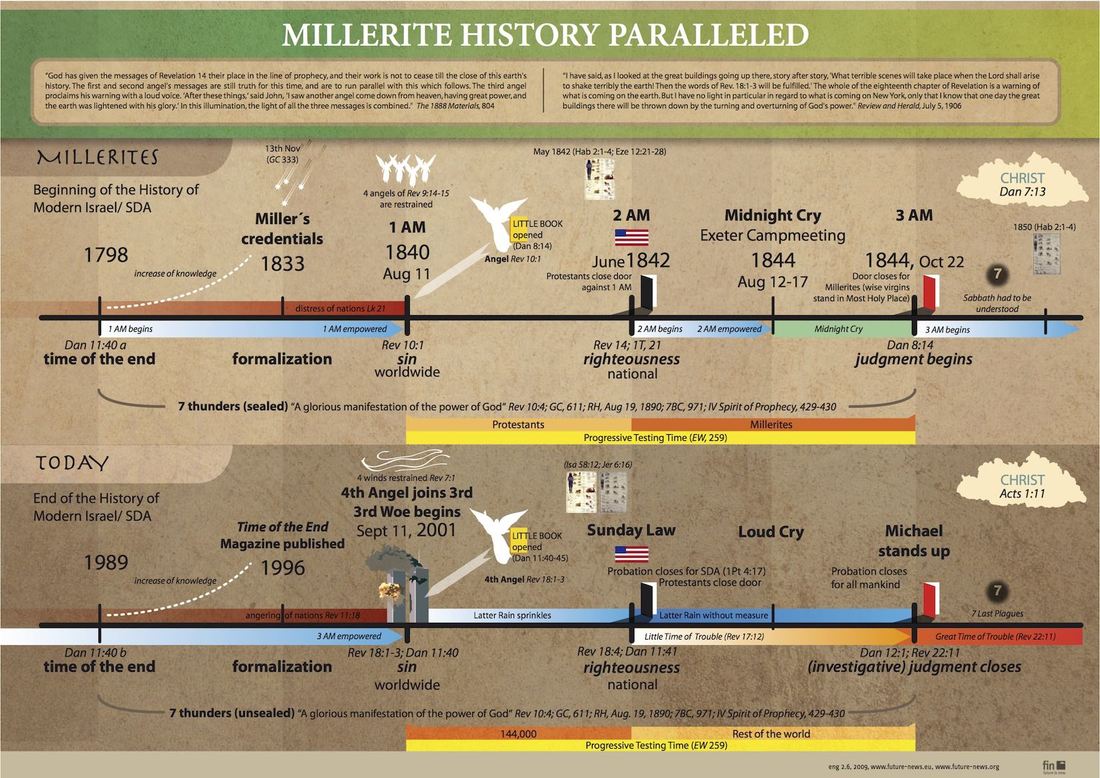|
ADVENT REVIEW AND SABBATH HERALD VOL. XXIII. BATTLE CREEK MICH., THIRD - DAY, JANUARY 26, 1864. No. 9. James White. page 68.1-12. The Seven Times of Leviticus. xxvi. The prophetic period of Leviticus. xxvi, or what has been supposed to be such, has been no small object of study among prophetical expositors. It has been supposed that the expression, “seven times,” in verses 18, 21, 24, 28, denoted a prophetic period of 2520 years, and that this period covered the time during which the throne of Israel should be and remain subverted and trodden down by oppressing powers. To rightly fix the commencement and termination of this period, became therefore a matter of consequence. Where does it commence? and where does it end? have been questions of much study, and perhaps some perplexity. These are not the questions, however, that we propose here to discuss; for there is a question lying back of these, which demands to be answered first; namely, Is there any prophetic period brought to view at all in Lev. xxvi? We claim that there is not, and will offer a few of what are to us very conclusive reasons for this position: 1. A series of judgements is threatened against Israel, in case they hearkened not unto God to do his commandments, before the expression, seven times, is introduced. Verses 14-17. In these judgements is included being slain before their enemies, being reigned over by those that hated them, and fleeing when none pursued them. Now if the seven times were meant to cover the period of God’s special judgements against Israel, especially of their captivity by foreign powers, these seven times should have been mentioned in connection with the first threatening of judgements of this kind. But this, as we have seen, is not the case. 2. After the threatening of these judgements, God says, verse 18, “And if ye will not for all this hearken unto me, then I will punish you seven times more for your sins.” Then follows and enumeration of the judgments to come upon them in fulfilment of this, different from the items of the first threatening, and increasing in severity. 3. If they would not for this hearken, seven times more plagues were threatened against them, “according to their sins.” verse 21. Then again follows an enumeration of judgments to correspond, more severe still than any preceding. 4. If they would not be reformed by these things, God threatened to punish them sevens time more for their sins. Verse 24. And in like manner with the forgoing, an enumeration of the judgments to be inflicted in fulfilment, immediately follows, more fearful still. 5. And if they would not hearken to God for all these things, he makes a final threat that would walk contrary to them in fury, and chastise them seven times for their sins. Verse 28. And an enumeration of the judgments to be inflicted, again immediately follows, outdoing all before, in their terrible severity. Included among them were the eating of the flesh of their sons and daughters, making waste their cities, bringing the land into such desolation that their enemies should be astonished at it, scattering them among all nations, and drawing out a sword after them in all the lands of their dispersion. With fearful minuteness all this has been fulfilled, even to the eating the flesh of their own children, as in the terrible sieges that preceded the downfall of Jerusalem. Thus we have, first a series of judgments threatened against Israel, without the expression, seven times, and then the declaration four times made, that God would punish them seven times for their sins, each one on condition that the former did not lead to repentance, and each one containing its own specific enumeration of judgments, distinct from those that preceded, and regularly increasing in the severity of their denunciations. Now what is meant by this repeated expression of seven times? We reply, It denotes, not the duration of the punishment, but its intensity and severity. It is well expressed in the language of verse 21, thus: “I will bring seven times more plagues upon you according to your sins.” The number seven denoting perfection, we are undoubtedly to understand by this expression, the fullness of their punishment; that the measure of their national sins, would in every case be fully equaled by the measure of their national calamities. And this position is fully sustained by the original as a brief criticism will show. In reference to the Hebrew, we learn from the Hebrew Concordance that the expression, seven times, In Lev. xxvi comes from sheh-vag; and this word is expressly set down by Gesenius, in those texts, as an adverb, also in Ps cxix, 164; Prov xxiv, 16. In Dan iv, 16,25, the expression seven times, twice occurs, where beyond question it means duration. Nebuchadnezzar was to be driven from men, and make his dwelling with the beasts of the field, until seven times should pass over him. There can be no mistaking that here the expression means a certain space of time; but here we find, not the adverb as in Lev. xxvi, but the noun, gid-dakn, defined by Gesenius, “Time, in prophetic language, for a year.” In Dan. vii, 25, where a prophetic period of brought to view in the expression, “a time and times and the dividing of time,” the same word os used. In Dan. xii, 7, where the same period is again brought to view, and in about the same language, we have another word, moh-gehd, defined by Gesenius, “Appointment of time. Spoken of a space of time, appointed and definite. In the prophetic style for a year.” It will be seen by this definition, that this word is synonymous with the one used in Dan vii, 25, as above referred to. Now if a period of time is meant by the expression, seven times, in Lev. xxvi, one of these words should and would most assuredly have been used. And the fact that neither of these words is there used, but another word, and that an adverb, places it beyond question that no such period is there intended. The Greek is equally definite. The Septuagint has in Lev. xxvi, heptakis, which is an adverb, signifying seven times. In Dan iv, 16,25, for Nebuchadnezzar’s seven times we have not heptakis , the adverb, but hepta kairoi, a noun and its adjective. And in all cases where the word time occurs, denoting a prophetic period, as in Dan. vii,25; xii,7; Rev xii,14, it is from the noun kairos. Such a thing as a prophetic period based on an adverb is not to be found. So then, there is no prophetic period in Lev. xxvi; and those who imagine that such a thing exists, and are puzzling themselves over the adjustment of it’s several dates, are simply beating the air. To ignore or treat with neglect, a prophetic period where one is plainly given, is censurable in the extreme. It is an equally futile, though not so heinous, a course, to endeavor to create one where none exists. DANIEL AND THE REVELATION. BY URIAH SMITH 1897 APPENDIX II. THE "SEVEN TIMES" OF LEVITICUS 26. Page. 736.2-737.2. Almost every scheme of the Plan of the Ages, Age-to-come, etc., makes use of a supposed prophetic period called the Seven Times; and the attempt is made to figure out a remarkable fulfilment by events in Jewish and Gentile history. All such speculators might as well spare their pains; for there is no such prophetic period in the Bible. The term is taken from Leviticus 26, where the Lord denounces judgments against the Jews, if they shall forsake him. After mentioning a long list of calamities down to verse 17, the Lord says: And if ye will not yet for all this hearken unto me, then I will punish you seven times more for your sins. Verse 18. Verses 19 and 20 enumerate the additional judgments, then it is added in verse 21: And if ye walk contrary unto me, and will not hearken unto me: I will bring seven times more plagues upon you according to your sins. More judgments are enumerated, and then in verses 23 and 24 the threatening is repeated: And if ye will not be reformed by me these things, but will walk contrary unto me; then will I also walk contrary unto you, and will punish you yet seven times for your sins. In verse 28 it is repeated again. Thus the expression occurs four times, and each succeeding mention brings to view severer punishments, because the preceding ones were not heeded. Now, if seven times denotes a prophetic period (2520 years), then we would have four of them, amounting in all to 10,080 years, which would be rather a long time to keep a nation under chastisement. But we need borrow no trouble on this score; for the expression seven times does not denote a period of duration, but is simply an adverb expressing degree, and setting forth the severity of the judgments to be brought upon Israel. If it denoted a period of time, a noun and its adjective would be used, as in Daniel 4:16: Let seven times pass over him. Here we have the noun (times) and adjective (seven): thus, shibah iddan); but in the passages quoted above from Leviticus 26, the words seven times are simply the adverb (sheba), which means sevenfold. The Septuagint makes the same distinction, using in Daniel 4:16, etc., but in Leviticus simply the adverb. The expression in Daniel 4:16 is not prophetic, for it is used in plain, literal narration. (See verse 25.) The times and seasons God has put in His own power. And why has not God given us this knowledge?-- Because we would not make a right use of it if He did. A condition of things would result from this knowledge among our people that would greatly retard the work of God in preparing a people to stand in the great day that is to come. We are not to be engrossed with speculations in regard to the times and the seasons which God has not revealed. Jesus has told His disciples to "watch," but not for definite time. His followers are to be in the position of those who are listening for the orders of their Captain; they are to watch, wait, pray, and work, as they approach the time for the coming of the Lord; but no one will be able to predict just when that time will come; for "of that day and hour knoweth no man." You will not be able to say that He will come in one, two, or five years, neither are you to put off His coming by stating that it may not be for ten or twenty years. . . . We are not to know the definite time either for the outpouring of the Holy Spirit or for the coming of Christ.--Review and Herald, March 22, 1892. {Ev 221.1} Christ gave to His disciples truths whose breadth and depth and value they little appreciated, or even comprehended, and the same condition exists among the people of God today. We too have failed to take in the greatness, to perceive the beauty of the truth which God has entrusted to us today. Should we advance in spiritual knowledge, we would see the truth developing and expanding in lines of which we have little dreamed, but it will never develop in any line that will lead us to imagine that we may know the times and the seasons which the Father hath put in His own power. Again and again have I been warned in regard to time setting. There will never again be a message for the people of God that will be based on time. We are not to know the definite time either for the outpouring of the Holy Spirit or for the coming of Christ. {1SM 188.1} I was searching through my writings, before coming to this meeting, to see what I should take with me to Australia, and I found an envelope on which was written, "Testimony given in regard to time setting, June 21, 1851. Preserve carefully." I opened it, and this is what I found. It reads: {1SM 188.2} "A copy of a vision the Lord gave Sister White, June 21, 1851, at Camden, N.Y. The Lord showed me that the message must go, and that it must not be hung on time; for time will never be a test again. I saw that some were getting a false excitement, arising from preaching time, that the third angel's message can stand on its own foundation, and that it needs not time to strengthen it, and that it will go with mighty power, and do its work, and will be cut short in righteousness. {1SM 188.3} Then I saw in relation to the "daily" (Daniel 8:12) that the word "sacrifice" was supplied by man's wisdom, and does not belong to the text, and that the Lord gave the correct view of it to those who gave the judgment hour cry. When union existed, before 1844, nearly all were united on the correct view of the "daily"; but in the confusion since 1844, other views have been embraced, and darkness and confusion have followed. Time has not been a test since 1844, and it will never again be a test. {EW 74.2}
1 Comment
|
Author
ArchivesCategories |



 RSS Feed
RSS Feed
